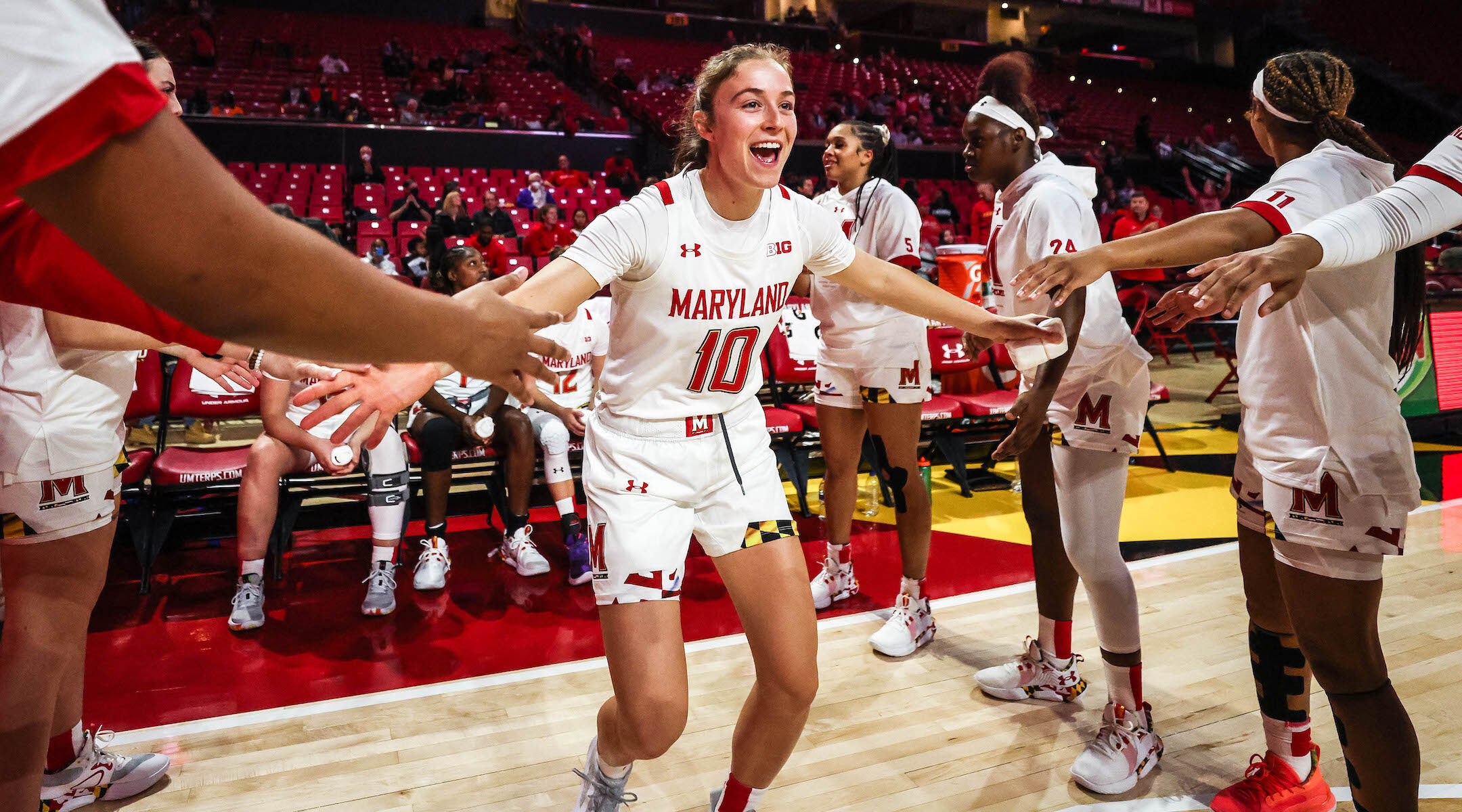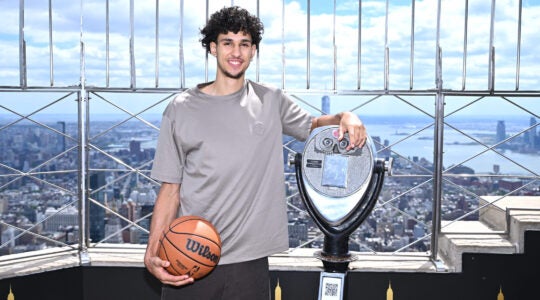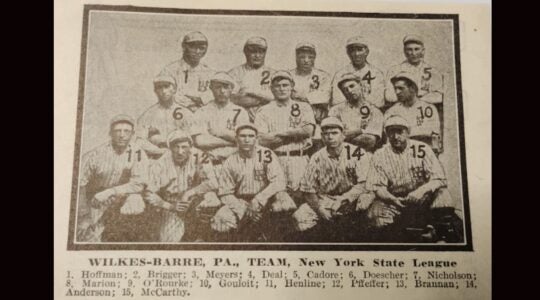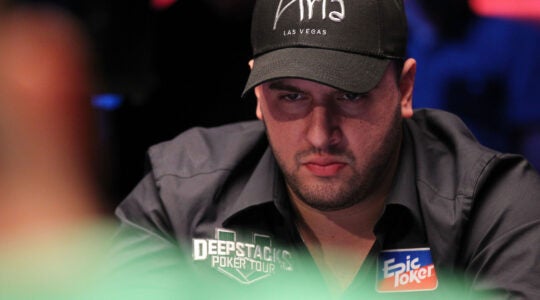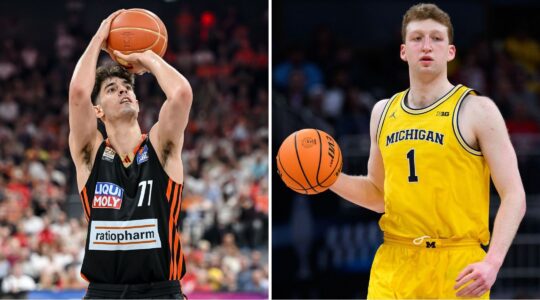(JTA) — Last July, Abby Meyers helped lead Team USA to a gold medal in women’s basketball at the Maccabiah Games, or the “Jewish Olympics,” in Israel. Starting next week, she hopes to embark on a run towards another championship: a Division I NCAA tournament title.
Meyers, a graduate transfer at the University of Maryland, is the starting shooting guard for a Terrapins team ranked sixth in the nation going into this Sunday, when the March Madness bracket seedings will be revealed. She averaged 14.5 points and 5.4 rebounds per game this season and was named to the All-Big Ten Second Team, an honor that singles her out as one of the best players in the powerhouse conference.
Last week, Maryland lost to Iowa in the Big 10 tournament semifinals. Last March, they lost in the Sweet 16 round to Stanford.
“I think it just gives us more motivation going into the NCAA tournament,” Meyers said. “Especially if you’re a competitor, no one likes losing. But that’s part of the game, right? You live, you learn. And we’re lucky to have another opportunity.”
One particular group could help motivate her during what she hopes will be a deep tournament run: her Jewish fans.
“There’s an amazing following of Jewish students who come to my games, who support me and love the fact that I’m Jewish,” she said. Her school has one of the largest populations of Jewish students in the country, at around 6,000.
Growing up in Maryland’s Montgomery County, she attended synagogue at the Reform Washington Hebrew Congregation in Washington, D.C. and was surrounded by Jewish friends in the DMV area — the colloquial acronym for the District of Columbia, Maryland and Virginia region. She didn’t begin playing basketball competitively until high school.
She played with her two sisters, Emily and Olivia, in high school, then went first to Princeton. There she played with two Jewish teammates, Kira Emsbo and Maddie Plank, who also played with Meyers at the Maccabiah Games last summer.
“I see myself as a female Jewish athlete, and I think it really came to fruition this past summer when I went to the Maccabiah Games in Israel and was able to play alongside so many amazing, talented Jewish athletes from all over the world,” Meyers said. “That was different for me, because I’ve never been around so many Jewish athletes before.”
Meyers had tried out and made the Maccabi USA women’s basketball team in 2017, but decided not to play because she was about to enter college — a decision she now calls naive. The Maccabiah Games is a quadrennial sports competition that convenes thousands of Jewish athletes from around the world for an Olympics-style tournament in Israel.
So when the 21st Maccabiah Games were set to return in 2022, Meyers didn’t want to miss out again. She found out that Plank, who now plays at Davidson College in North Carolina, would be trying out, and that her assistant coach at Princeton, Lauren Battista, was a Maccabiah alum. Maccabi USA women’s basketball coach Sherry Levin also reached out to Meyers, and chose the 6-foot guard as team captain early on.
“I can’t speak more highly of a player that I’ve coached than Abby Meyers. And I’ve coached a lot,” Levin said. She hailed Meyers’ basketball IQ, her selflessness on the court and her leadership. “She checks every box.”
Meyers, who had never been to Israel, said the experience was “by far the most fun I’ve ever had.”
“It’s way more than just basketball. It’s really learning about your history, your ancestry and just appreciating all things Jewish,” Meyers said.
In addition to winning the gold medal, Meyers said her visit to the Yad Vashem Holocaust museum in Jerusalem stood out to her.
“To be there, in Jerusalem in that moment, it was really just a reflective moment,” Meyers said. “It made me just appreciate the opportunity I had to represent my country being a Jewish athlete, and to also have that opportunity to be there, in person, to be safe, to be healthy, and to just appreciate those who came before me.”
Plank echoed Levin’s praise for her teammate.
“Abby is probably the most basketball-loving, passionate, driven character that I’ve ever been around in my life,” Plank said. “She just leads by example. It’s such a pleasure being on the court with her.”
Plank said she and Meyers keep in touch now that they’ve both left Princeton (they played against each other this season — Maryland beat Davidson 70-52). She said she hopes to see Meyers in the WNBA one day.
If that WNBA dream doesn’t come to fruition for Meyers, she said that she is open to the possibility of playing professionally in Israel.
Meyers joined her close-to-hometown school as a graduate transfer last year after three seasons at Princeton, where she was unanimously named the Ivy League Player of the Year and earned First Team All-Ivy honors in her final year. She made the move in part to be closer to her family, including her grandmother, who she said has not been able to see many of her games.
Back at Maryland, Meyers isn’t surrounded by many Jewish players on the court. But she does appreciate the opportunity to explain concepts such as synagogue, Hebrew school and the Holocaust to non-Jewish teammates.
“I’m always happy and proud to be able to not educate, but to inform them on what it’s like to be Jewish,” she said. “There’s plenty of Jewish stereotypes out there, whether it’s looks, or that we’re just hardworking go-getters, which I love, because we are. But it’s special to have that kind of interaction with them where they’re open and willing listeners and learners.”
On campus at both Princeton and now Maryland, Meyers said she has engaged with chapters of the Chabad-Lubavitch Hasidic movement — which performs outreach and holds programming for a wide range of Jewish students on campuses across the country — and other centers of Jewish life.
“I was able to meet so many cool Jewish students who knew me and knew that I play basketball and have been to my games,” Meyers said. “It was just great to tap into that community, because automatically you feel like they’re your immediate friends.”
JTA has documented Jewish history in real-time for over a century. Keep our journalism strong by joining us in supporting independent, award-winning reporting.
